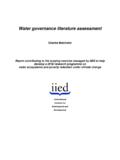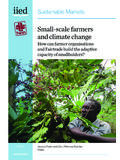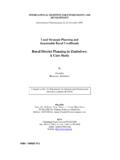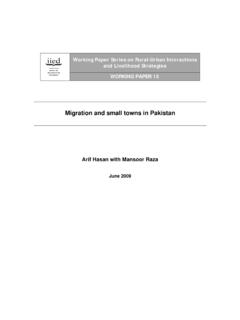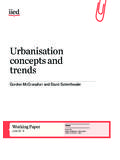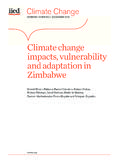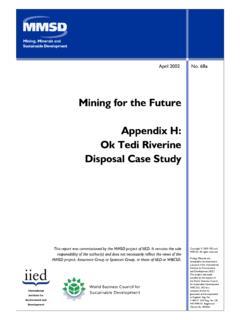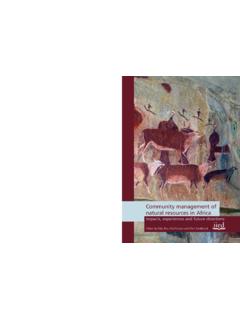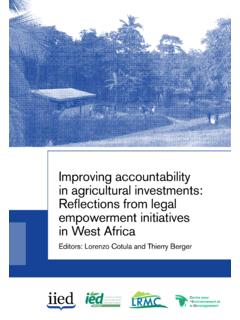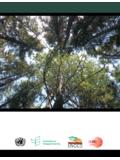Transcription of Poverty and Environmental Degradation: a …
1 Poverty and EnvironmentalDegradation: a LiteratureReview and AnalysisAnantha DuraiappahCREED Working Paper Series No 8 October 1996 International Institute for Environment and Development, LondonInstitute for Environmental Studies, AmsterdamThe authorAnantha Duraiappah is a senior research economist at the Institute for Environmental Studies (IVM),Amsterdam. He may be contacted at:IVMV rije UniversiteitDe Boelelaan 11151081 HV AmsterdamTHE NETHERLANDSTel:31 20 444 9555 Fax:31 20 444 9553email: programme of Collaborative Research in the Economics of Environment and Development (CREED)was established in 1993 as a joint initiative of the International Institute for Environment and Development(IIED), London, and the Institute for Environmental Studies (IVM), Amsterdam. The Secretariat forCREED is based at IIED in London. A Steering Committee is responsible for overall management andcoordination of the CREED Economics Programme, IIEDIIED is an independent, non-profit organisation which seeks to promote sustainable patterns of worlddevelopment through research, training, policy studies, consensus building and public information.
2 TheEnvironmental Economics Programme is one of seven major programmes of IIED; it conducts economicresearch and policy analysis for improved management of natural resources and sustainable economicgrowth in the developing Economics ProgrammeIIED, 3 Endsleigh StreetLondon WC1H 0DD, UKTel (44 171) 388 2117; Fax (44 171) 388 2826e-mail: for Environmental Studies, (IVM)IES is a non-profit research institute, based at Vrije Universiteit, Amsterdam. The Institute's primaryobjective is to carry out multi- and interdisciplinary research on Environmental issues, based on cross-fertilisation of monodisciplinary sciences. Environment and the Third World is one of eight major IVMresearch , Vrije UniversiteitDe Boelelaan 11151081 HV AmsterdamThe NetherlandsTel: (31 20) 444 9555; Fax: (31 20) 444 9553e-mail: Steering Committee members include:Prof Johannes Opschoor, Institute for Social Studies, The Netherlands (Chair)Prof Gopal Kadekodi, Institute of Economic Growth, IndiaDr Ronaldo Seroa da Motta, IPEA, BrazilDr Mohamud Jama, Institute for Development Studies, KenyaDr Anantha Duraiappah, IVM, The NetherlandsProf Harmen Verbruggen, IVM, The NetherlandsJoshua Bishop, IIED, UKMaryanne Grieg-Gran, IIED, UKAbstractThere is much controversy surrounding the Poverty - Environmental degradation nexus.
3 Thepredominant school of thought argues that Poverty is a major cause of Environmental degradationand if policy makers want to address the Environmental issues, then they must first address thepoverty problem. Another school of thought argues that this causal link is too simplistic and thenexus is governed by a complex web of factors. In this paper, a formal structure for analyzing thecomplex web of factors is formulated and used to review the existing literature on the links betweenpoverty and the degradation of four natural resource sectors. The analysis highlights the institutionaland market failures which encourage unsustainable activities, which in turn forces some incomegroups into Poverty . Another important factor is the role of conflicts between different agents(income groups) in the Poverty - Environmental degradation nexus.
4 The analysis also highlighted thepresence of feedback loops between Environmental degradation and Poverty .*Abr g Le complexe causal pauvret -d gradation de l environnement soul ve bien des l cole de pens e dominante, la pauvret est cause majeure de la d gradation del environnement et si les politiques veulent s occuper des difficult s de ce dernier, il leur faut d abords attaquer au probl me de la pauvret . Une autre cole estime qu un tel lien de causalit est tropsimpliste et que le complexe causal est soumis toute une trame compliqu e de facteurs divers. Cedocument pr sente une structure formelle destin e analyser la trame compliqu e de ces facteurs,structure appliqu e ensuite la lecture des publications existantes qui traitent des liens entre lapauvret et la d gradation de quatre cat gories de ressources naturelles. L analyse met en lumi reles d ficiences institutionnelles, ainsi que celles du march , qui encouragent des activit s sansdurabilit , lesquelles, leur tour, pr cipitent dans la pauvret certaines cat gories de revenus.
5 Unautre facteur important r side dans le r le des conflits entre diff rents agents (cat gories de revenus)au sein du complexe causal pauvret -d gradation de l environnement. L analyse met aussi enlumi re la pr sence de boucles d auto-alimentation mutuelle reliant les deux termes du una gran controversia acerca del nexo entre la degradaci n ambiental y la pobreza. Laescuela de pensamiento predominante afirma que la pobreza es una causa fundamental dedegradaci n ambiental y que, si las decisiones pol tica aspiran a tener un impacto sobre losproblemas ambientales, deber n primero enfrentar el problema de la pobreza. Existe otra escuelade pensamientio que sostiene que proponer este v nculo causal es demasiado simplista y arguye, encambio, que tras el nexo existe una compleja red de factores. En este art culo se propone unaestructura formal de an lisis de dicha compleja red de factores que se emplea en rese ar la literatura * The author would like to thank Jyoti Parikh and Christiaan Grootaert for their comments and suggestionswithout which this paper would not have been possible.
6 The author would also like to acknowledge the followingpeople for taking the time to read and comment on the paper: Peter van der Werff, Joyeeta Gupta and HarmenVerbruggen. The usual disclaimer acerca de la relaci n entre pobreza y degradaci n utilazando como foco cuatro tiposde recursos naturales. El an lisis hace nfasis en los fracasos institucionales y las fallas de mercadoque promueven actividades no sustentables, las cuales a su vez conducen a ciertos grupos sociales ala pobreza. Otro factor importante es el peso que adquiere el conflicto entre los diversos agentes(grupos sociales) en el nexo entre pobreza y degradaci n ambiental. El an lisis tambi n pone depresente la existencia de elementos de retroalimentaci n causal entre degradaci n ambiental NumberIntroduction1 Poverty and Environmental Degradation3 Analytical Framework for Literature Review5 Forest sector8 Main activities contributing towards deforestation8 The social and economic consequences ofunsustainable deforestation activities11 Literature analysis13 Land degradation15 Main activities contributing towards land degradation15 The social and economic consequences of land degradation17 Literature analysis17 Water resources19 Main activities contributing to water resource degradation19 The social and economic consequences of water pollution21 Literature analysis22 Air (Indoor and Outdoor)
7 24 Main activities contributing towards air pollution24 The social and economic consequences of air pollution 25 Literature analysis25 Conclusions27 References291 CREED Working Paper Series No 81 IntroductionThe poor have traditionally taken the brunt of the blame for causing society s many problemsincluding, more recently, Environmental degradation . There is a general consensus that Poverty is amajor cause of Environmental degradation . For example, in one of the conclusions of the BruntlandCommission Report, which incidentally has been accepted as the blue print for environmentalconservation, it was explicitly stated that, Poverty is a major cause of Environmental problems andamelioration of Poverty is a necessary and central condition of any effective programmes addressingthe environment. Following similar lines, Jalal (1993), the Asian Development Bank's chief of theenvironment department says, "It is generally accepted that Environmental degradation , rapidpopulation growth and stagnant production are closely linked with the fast spread of acute Poverty inmany countries of Asia".
8 The World Bank joined the consensus when in the 1992 WorldDevelopment Report, the Bank explicitly stated that, poor families who have to meet short termneeds mine the natural capital by excessive cutting of trees for firewood and failure to replace soilnutrients (World Bank1992).However, there has been a rising trend in the economic literature which disputes the conventionaltheory and argues that simple generalizations of this multi-dimensional problem are erroneous andthat a more complex set of variables are in play (Leach and Mearns, 1995). These studies point todemographic, cultural, and institutional factors as important variables in the Poverty -environmentaldegradation nexus. An intricate web of factors plus the existence of feedback loops fromenvironmental degradation to Poverty makes the process of identifying causality links, if any,between Environmental degradation and Poverty a difficult exercise.
9 However, these studies havebeen few and isolated and it is interesting to note that until recently, there has been very little in-depth coordinated empirical research in the economics of Environmental degradation -povertycausality brings me to the purpose of this paper. Both Poverty and Environmental degradation have beenincreasing in many developing countries, hence there is a pressing need first to evaluate and analyzethe Poverty - Environmental degradation nexus, and second, to prescribe policy options to mitigate oreradicate these two paper which is part of a larger volume is a response to this demand. The primary objective ofthe paper is to analyze critically the existing literature on the Poverty - Environmental degradationnexus and try to make "some order out of the chaos" inherent in this complex and difficult paper is divided into four sections.
10 The second section gives a brief overview of the presentstatus of Poverty and Environmental degradation around the world The section discusses somecommon definitions used in defining Poverty and Environmental degradation and provides someguidelines for the definitions to be used in this the third section, a conceptual framework of the Environmental degradation - Poverty nexus isprovided. The fourth section will contain the main body of the analysis. In this section, a differentapproach to those of previous literature reviews (Leach and Mearns, 1995, UNEP, 1995) isadopted. Rather than focusing on the "web of factors" which underlie the nexus, the approach usedin this paper begins by identifying the resource factors being Working Paper Series No 82 For this paper, we limit our analysis to the following four main natural resources which are underserious threat of degradation in many developing countries: i) forests; ii) land; iii) water; and iv) air.
